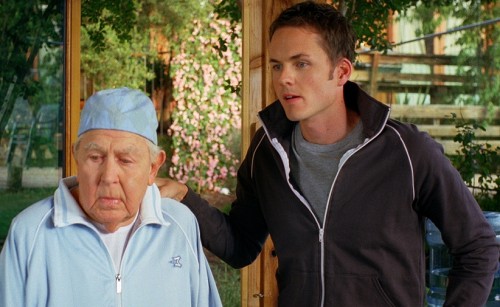Play the Game
The Go Straight to Jail Card

Starring: Andy Griffith, Paul Campbell
By Robert Patrick
“Grandpa’s horny,” bellows out the newly mercurial Andy Griffith. “And he wants to have some fun.” These lines, fostering a kind of disregard for the antiquated material of the television star’s past, come zipping out of Griffith’s mouth at full-steam. The 83 year-old actor cranks back his arm, yelps indiscriminately at elderly women, then lifts his chalky-white eyebrows in unabridged bouts of perversion. Play the Game, a labor of love for first time director Marc Fienberg, shoehorns the former magistrate of Mayberry into situations that involve oral copulation, erection gags, and inescapably bad dialogue. At times like this, you wish the gregarious Barney Fife would stretch out a hand, yank the slack jawed Griffith away from the movie, then spin some sort of moral yarn about bad decisions.
The plot revolves around the seemingly dapper David (Paul Campbell), an overconfident ladies man, whose arrogance is omnipotent in every conversation he has. When David isn’t painting the town red with his mercurial accomplice, Rob (Geoffrey Owens), he is spinning tall tales to customers at a used car lot. In short, David’s sincerity is commonly fleeting. The only time when our protagonist is even remotely likable is when he is chatting with his grandfather, Joe (Andy Griffith), who resides in a retirement home. Joe is a warm-spirited old badger with the morals that his grandson lacks. This, as you can imagine, is where the two bond, learn things from one another, then utilize their newly acquired information on women in their lives. Yawn.
David’s plastic exterior is melted away into a malleable hunk of romanticism, while Joe turns into a lady killer. Because the two act in ways we could never imagine, the script purports to be hilarious, heartwarming, or transcendent. Instead it becomes a flimsy piece of celluloid that stuffs itself with sex jokes.
Griffith spends most of his screen time burbling his dialogue, making wide-eyed expressions and hamming it up as a naïve man-child. Watching the monolithic small screen actor dance, ever so awkwardly, to a modern pop song in a night club isn’t so much funny as it is petrifying – isn’t this type of sophomoric tripe reserved for the likes of the wonky Eugene Levy? And despite everyone’s incessant attempts to make it some sort of humorous staple, one should not believe that the irregular sight of an older man dressing in hip-hop clothing is the boarding station for irreverent comedy. Griffith, during his screen time, repeats such cringe-inducing lines as “I’m dope, playa”, making me think that he has no problem shucking his reputability. And if you think Viagra jokes would escape the foundation of Fienberg’s rueful screenplay, you will be belling in agony to learn that the film relies heavily on them to evoke belly laughs from the theatre’s beleaguered patrons.
And how about the lead in the film? Paul Campbell’s performance – if you want to brand it a performance – is so unsparingly maudlin and over-baked it seems to be soaked in a sort of sheen used by the likes of soap opera stars. How his name is plucked to be on any marquee’s lights is an abomination to cinema everywhere. Campbell’s atrocious overacting shouldn’t be the mantel of the movie’s wrongdoings, however, as every member of the cast commits similar sins. All of the players in the film, at one point or another, stretch their facial expressions into wild and animated contortions that would even make La Strada’s Giulietta Masina shake her head in disapproval. And the film’s humor, another eyesore in Fienberg’s opus, is so forced, droll, and inexplicably unnatural that I expected to hear drum rolls before each joke unraveled into a heap of moan induced misery. Is having a stroke a never-ending well to draw laughs from? I don’t think so. Will a joke about having intercourse with an elderly woman, until she has a heart attack, be seen as a venerable attempt at hilarity? Probably not. Play the Game isn’t really a highbrow film, by any means, as it aspires to be little more than a senior’s version of The Hangover, or some other belch-driven comedy strung by the puppetry of a giggling director.
Superfluous one-liners and cover-your-mouth sight gags, such as a not so dubious sexual exchange between Griffith and Campbell’s characters, simply exist for the shock value. The content of a script should drive the film, not stall it. Fienberg’s writing seems more concerned with looping Griffith into taboo circumstances, solely for the purpose of seeing the audience’s blushing faces and restrained chuckles, than to actually bolster the film with thoughtful situations about old age. Play the Game obviously wants to wring the novelty dry with Griffith, making him more of a sideshow act than a believable character. Why cant Griffith’s portrayal of Joe become whimsical and honest without tired plugs about modern slang? The buzz around the movie, spawning from a twelve year battle to get the film finished, is more interesting than the actual endeavor, which ends up feeling like a cataclysmic disaster. Some viewers may find it cute, some may find it appalling, I find it simply expendable.
1/5
Playing at Landmark’s La Jolla Village
